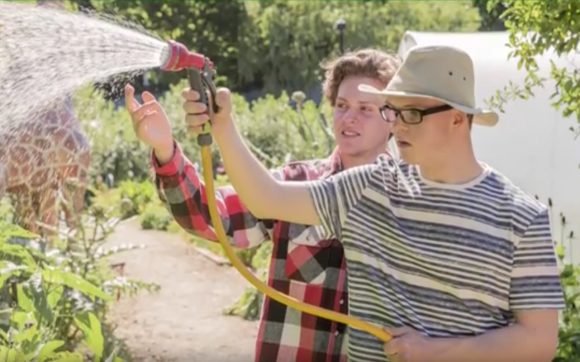
According to the Centers for Disease Control and Prevention, more than six million individuals in the United States have developmental disabilities. About one in six children between the ages of 3 and 17 in the U.S. has one or more developmental disabilities or developmental delays. To better serve this population, it is important for professionals in a wide variety of fields to gain an understanding of the characteristics and needs of people living with disabilities.
Rutgers Cooperative Extension faculty Michelle Brill, educator in the Department of Family and Community Health Sciences, and Jeannette Rea Keywood, state 4-H Agent in the Department of 4-H Youth Development, have created a series of online and in-person training courses to prepare professionals and volunteers to work effectively with this population.
The online portion of the Developmental Disabilities Training Series, which was developed in partnership with instructional design staff at Colorado State University Online, consists of five courses that provide foundational knowledge needed to effectively teach, assist and work with youth and adults with disabilities. In addition, the courses will teach professionals how to identify different behavioral patterns and implement effective instructional strategies to manage the educational setting.
The in-person component of the training is available as half- or full-day sessions for Extension staff and volunteers, formal and non-formal educators, youth organization staff, caregivers and other individuals who provide programming and/or support for youth and adults with developmental disabilities. Unlike the online component, the in-person professional development sessions can be tailored to meet the needs of a specific audience.
However, in both components, professionals will learn how to prevent or address specific behaviors as well as learn techniques to better engage individuals with developmental disabilities within their programs and services. The training covers the indicators, learning styles and behaviors commonly associated with developmental disabilities, including Autism Spectrum Disorders, learning disabilities, Sensory Processing Disorder, Attention Deficit Disorder, intellectual disability and Tourette Syndrome.
The Q&A below provides a snapshot of what professionals should expect from the Developmental Disabilities Training Series online courses.
What are developmental disabilities?
Developmental disabilities are cognitive or physical impairments that can affect communication, learning, physical function and behavior. These disabilities begin during the developmental period of a person’s life — often during prenatal development, infancy or childhood — and can persist throughout a person’s lifetime.
Gain a deeper understanding
Building knowledge can increase your confidence and effectiveness when working with people with disabilities. Learn how to identify and navigate different behavioral patterns and implement helpful strategies to manage challenges. This program places a strong emphasis on understanding different learning styles and using visual support aids in teaching and communication. Coursework also delves into the legal protections and accommodations that must be taken into account by educators and other professionals.
Who should take this program?
This program is designed for Cooperative Extension professionals and volunteers, youth development professionals, and individuals in a wide variety of settings who educate, train, manage, employ, interact with, or provide services to people with developmental disabilities. Although it is well-suited for care providers, disability professionals, school administrators, teachers, trainers, counselors and HR professionals, it also benefits anyone who has frequent contact with individuals or family members with developmental disabilities.
Study at your own pace
Courses in this online program are self-paced. Study on your own schedule, and customize your learning experience to match your individual goals. Take all five courses to earn your Mastery Badge, or take only the courses you’re most interested in. (Please note the first course is a prerequisite for other courses). Learn more about how digital badging works.
For information on the courses or to schedule an in-person training session, contact Michelle Brill by email at brill@njaes.rutgers.edu or by phone at 609-989-6831; or Jeannette Rea Keywood by email at reakeywood@njaes.rutgers.edu by phone at Youth Development, Rutgers Cooperative Extension at 609-827-0199.

